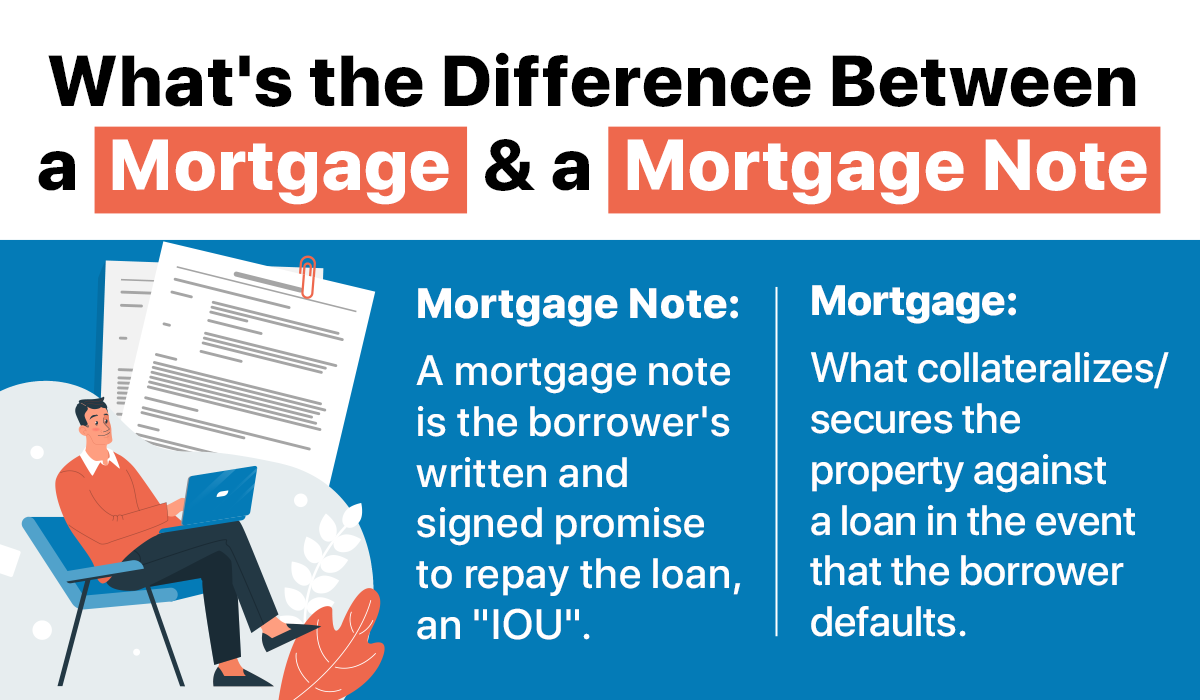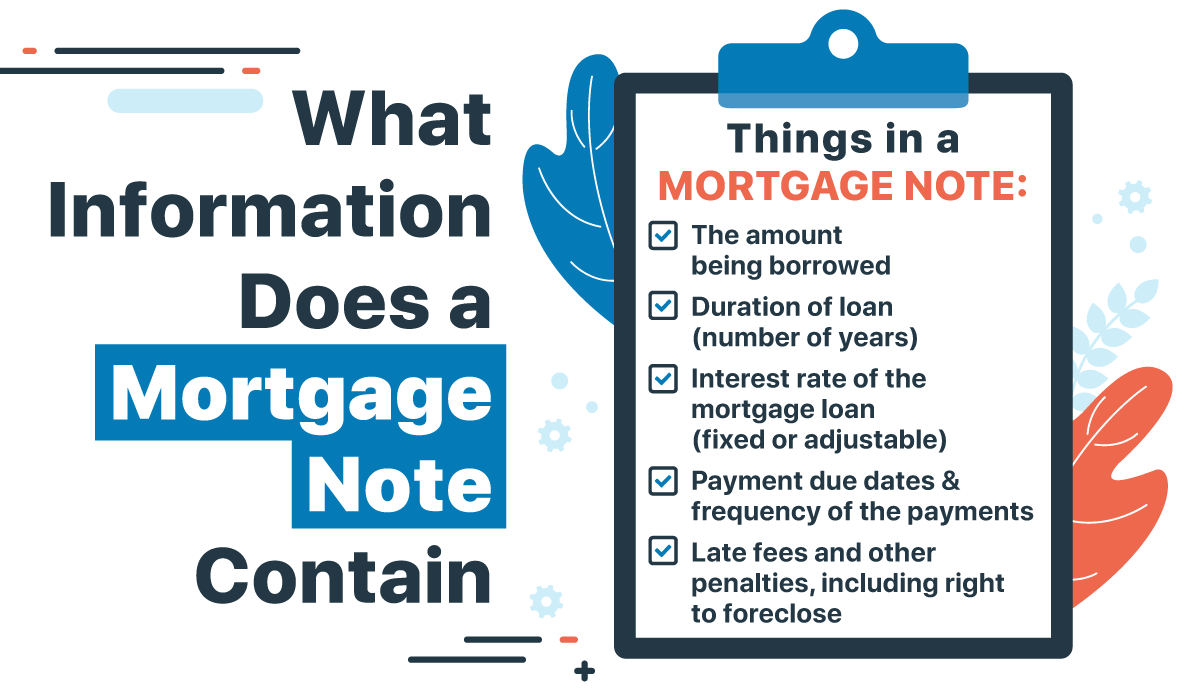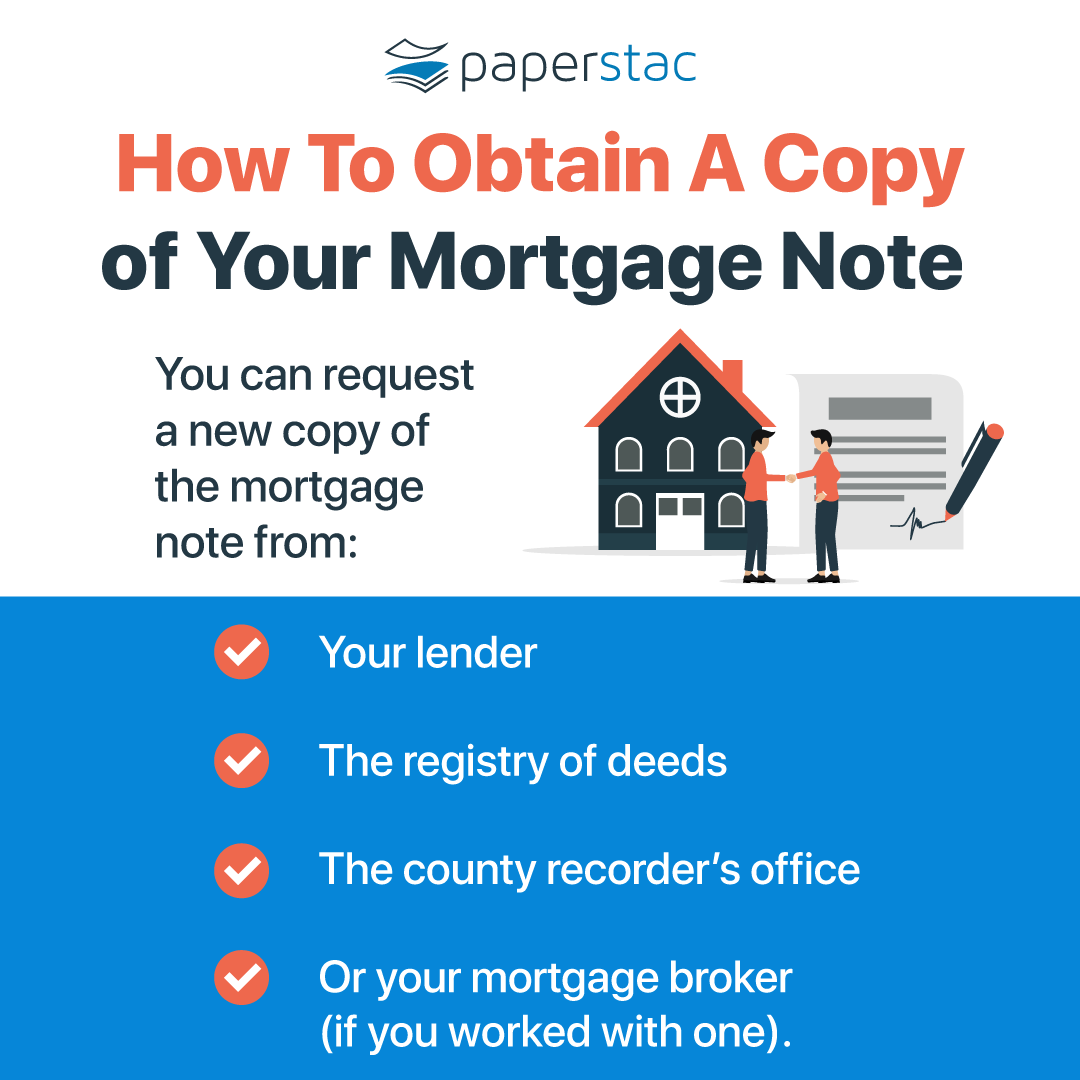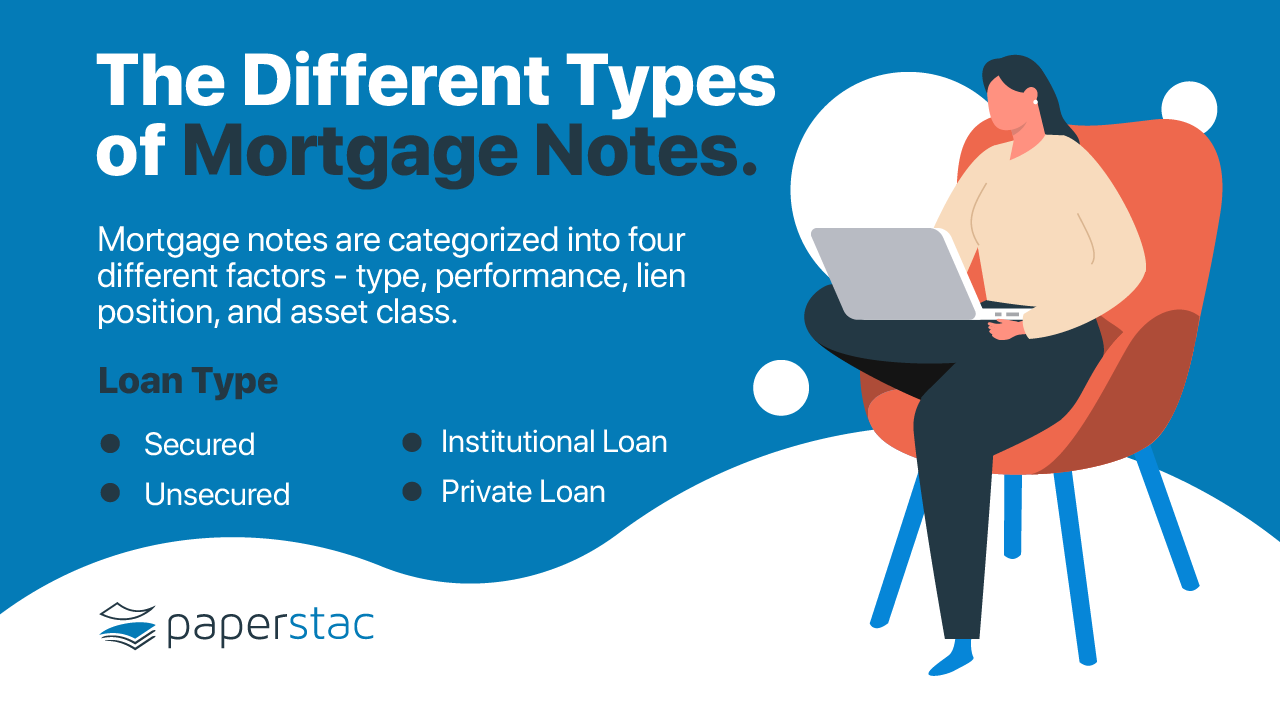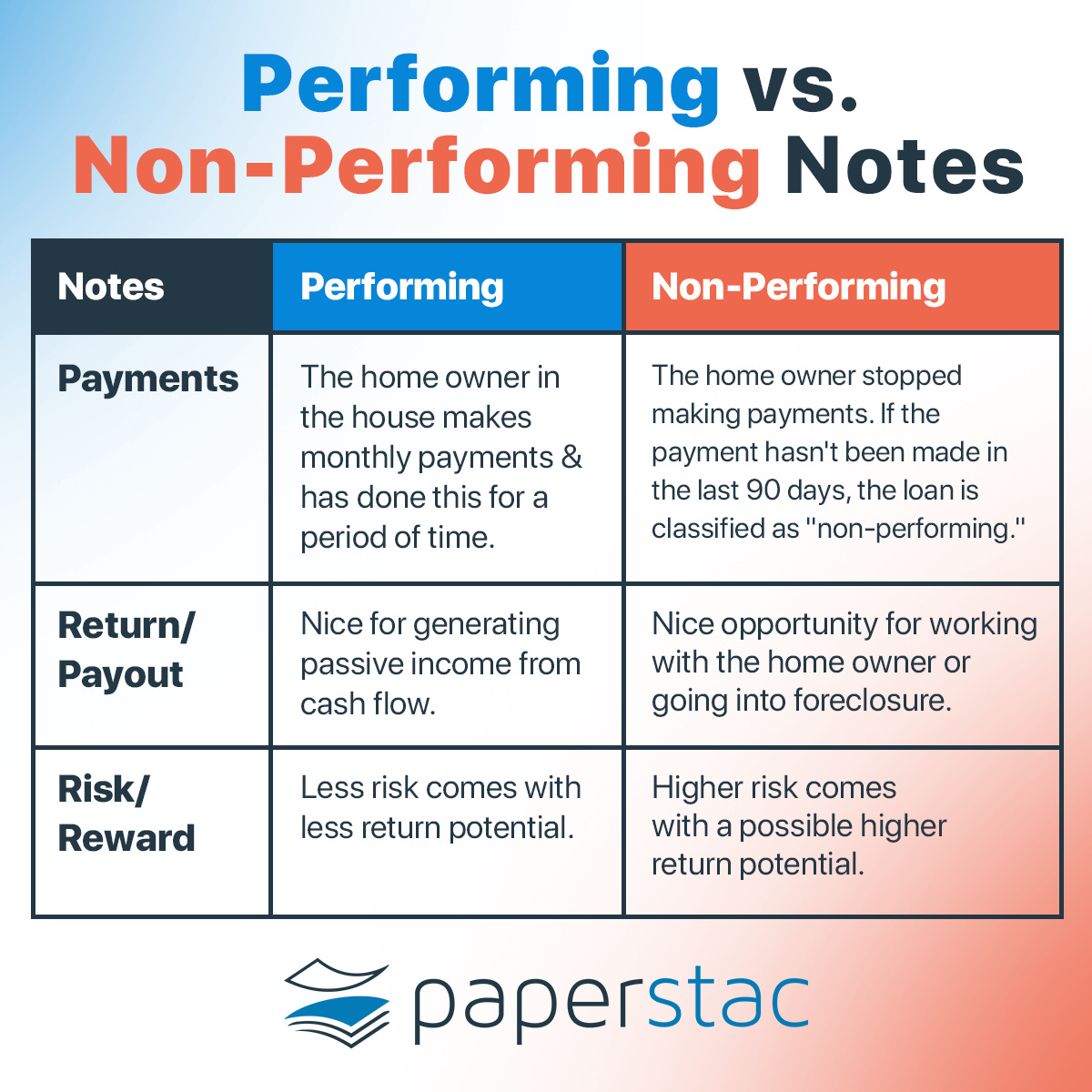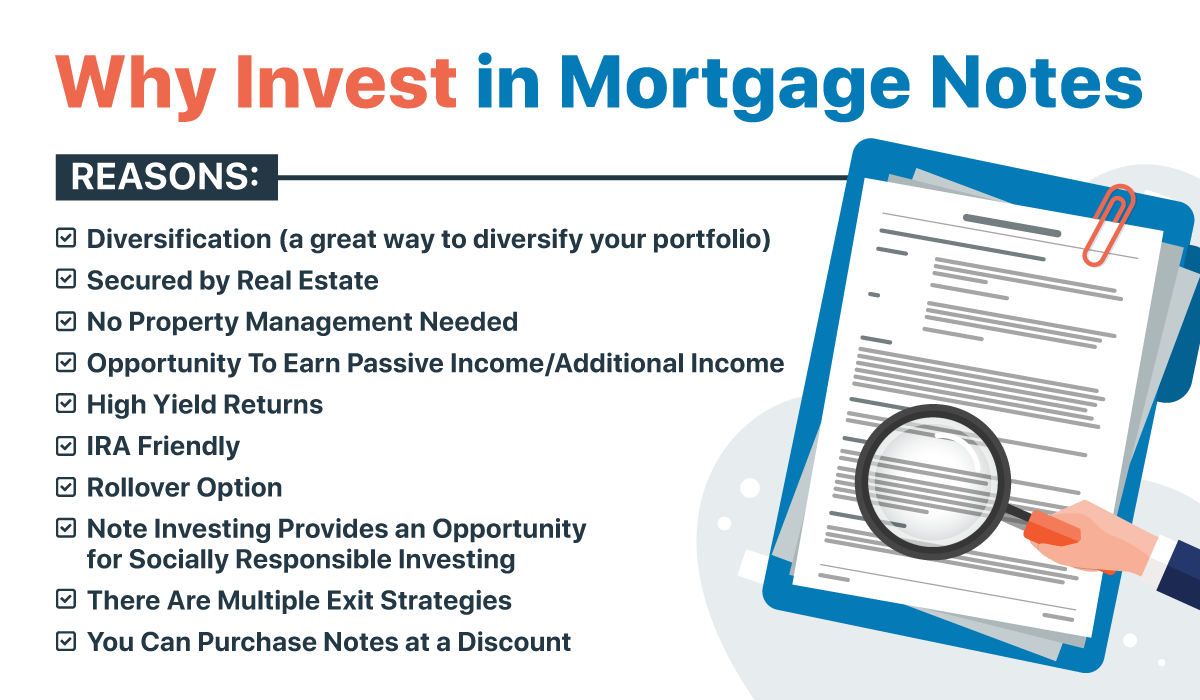Mortgage note investing frequently provides higher-than-average returns for real estate investors. Offering a variety of advantages and opportunities to both accredited and non-accredited investors. But, what is a mortgage note, exactly? What's the best way to turn mortgage notes into a dependable source of income?
This blog post will dive deeper into the topic of mortgage notes. You'll learn about the different types of mortgage notes, the benefits of investing in them, and where to find opportunities to invest. By the end of this post, you'll have a better understanding of what a mortgage note is, and how you can potentially profit from investing in them. So, continue reading to learn more about this exciting investment opportunity.
Topics Covered
What Is A Mortgage Note: Mortgage Note Definition
Deed of Trust vs. Mortgage
Mortgage vs. Mortgage Note
What Does a Promissory Note Do?
What Does a Mortgage Note Look Like?
What’s Contained in a Mortgage Note?
How To Get A Copy of Your Mortgage Note?
Different Types of Mortgage Notes
Performing vs. Non-Performing Notes
Why Buy Mortgage Notes?
Where Can I Buy Mortgage Notes?
What Is A Mortgage Note?
What is a mortgage note? If a homebuyer, or a real estate investor cannot pay the full purchase price of the real estate at closing, they must apply for a home loan. After making a down payment, the lender gives the homebuyer, or borrower money in exchange for signing a promissory note or mortgage note, and a mortgage (or deed of trust).
So, what is a mortgage note, exactly? A mortgage note, also referred to as a promissory note, real estate note, or note, is a written description of the mortgage. It is the document that specifies how the borrower will repay their loan and uses their home as collateral.
Mortgage Note Definition:
A mortgage note is a security instrument or an "IOU" in simple terms.
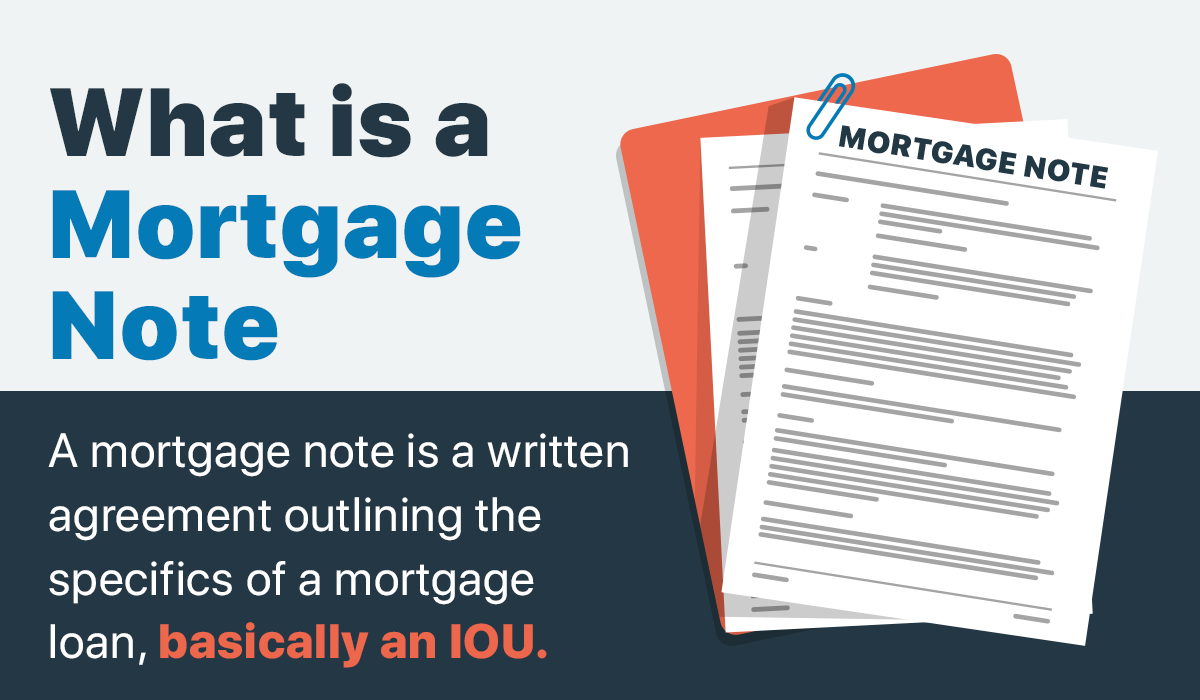
Deed of Trust vs. Mortgage
In certain states, borrowers and lenders will use a deed of trust instead of a mortgage. Both of these legal documents are security instruments. Meaning they provide the lender a way to take back the home through foreclosure. However, a deed of trust differs from a mortgage and includes the appointment of a trustee to act as the legal owner of the property until the debt is repaid.
A key difference between a deed of trust vs. mortgage is who holds the title. The trustee holds the title until the debt is repaid with a deed of trust. And with a mortgage, the borrower holds the title.
The foreclosure process also differs. Deed of trust states typically have a non-judicial foreclosure process. As a result, with a deed of trust, the trustee can sell the property without a court order. Whereas, with a mortgage, the lender must attain a court order in order to foreclose on a home. This is referred to as judicial foreclosure. The home’s closing statement discloses whether it is a deed of trust or mortgage.
Mortgage vs. Note
A mortgage is a loan that is secured by real estate. This loan allows a borrower to finance the purchase of a home or real estate property. This is the document that grants the lender a security interest in the property until the note is completely paid off. If the borrower fails to make their loan payments, and the debt is not paid, the lender can sell the home through a process known as foreclosure. Which means they can foreclose on the property to enforce its security interest.
A mortgage note, on the other hand, is a written agreement outlining the specifics of a mortgage loan, essentially an "IOU." A mortgage note is the document that is prepared and signed at the time of closing that outlines the terms of the agreement. As mentioned, anyone named as a borrower on the note is personally liable for repaying the lender.
Difference Between Mortgage and Note
The main difference between a mortgage and a note is that a mortgage note specifies the terms of borrowing money, and the borrower agrees to them by signing it. Whereas, the mortgage is a legal arrangement that spells out what steps will be taken if you don't pay your loan back according to the terms outlined in the note.
The mortgage serves as collateral allowing the property to be sold to pay off the obligation. With a mortgage note, the note holder or lending institution has the option of taking legal action against the buyer to recoup the losses, but this can take time and resources.
It’s important to also mention, just because someone is on the mortgage doesn't make them personally liable for the debt. Only the person who signs the mortgage note is personally liable for the debt.
To sum up, the mortgage note contains your promise to repay the loan and the person who signed the note is the one responsible for repaying the debt. If the borrower fails to keep that promise, the mortgage describes what happens, allowing the lender to enforce its security interest by foreclosing on the property.
Note vs. Mortgage Similarities
Both signify an agreement between two parties.
Both of these documents are legally binding.
Mortgage loans and mortgage notes are similar in that they both require the buyer to make a regular monthly payment (either monthly or bi-monthly) until the borrower pays it off in full.
If the borrower does not repay the amount they are borrowing, the lender can sue the borrower under the mortgage document or the note.
These two documents serve different functions, but they go hand-in-hand. Specifically, a lending institution will never create a mortgage note without a mortgage.
What Does a Promissory Note Do?
Essentially, the promissory note is there to protect both the payor and the payee throughout the life of the loan. Borrowers in certain jurisdictions may demand that the foreclosing party provide the real estate note as proof that they are the genuine owners of the loan during foreclosure proceedings if the borrower defaults.
What Does a Mortgage Note Look Like?
A mortgage note is a legally binding document that specifies the amount of debt owed (the loan balance), the rate of interest, monthly payments, as well as the borrower's personal responsibility for repayment.
What Does A Mortgage Note Contain?
What Information Does A Mortgage Note Contain? A mortgage note contains all the terms of the mortgage between the borrower and lender (note holder). This legal document outlines the terms including:
Amount of loan (also known as the principal)
Duration of loan
Interest rates of the loan
Monthly payment amount & due dates
Late fees and other penalties
The legal process in case of a foreclose
To sum up, a mortgage note includes information such as the loan amount that the borrower owes, interest rate, payment due dates, the duration for repayment, and where the payments are to be sent. A section of the note also details what happens if the note's terms aren't followed.
How Does A Mortgage Note Work?
A note is a legally enforceable security instrument, despite it not being recorded in public records.
If a borrower makes all of the required monthly payments and completely pays off the loan, which can take years, the lender marks the promissory note as "paid in full" and returns it to the borrower. If the borrower fails to make the payments, private lenders can still collect the money by using the mortgage to foreclose on the home and take back the real estate as a REO (Real Estate Owned).
Make Sure You Have The Original Note
When buying notes, you want to make sure you have both the original note and the collateral package. Occasionally, mortgage notes get destroyed, and a lost note affidavit will need to be created in its place.
As long as a copy of the note is there, this is okay. However, whenever you buy collateral, make sure you have the original wet ink promissory note because it confirms you own the debt.
For instance, if a check is made out to blank, who would be entitled to the money? In other words, it would belong to whoever has the check in their possession.
How to Get a Copy of Your Mortgage Note?
A borrower can receive a copy of their mortgage note in a few different ways. You can go straight to the Service provider. Loan Servicers are required by the Federal Servicer Act to reply to eligible written requests for information about the loan. A loan Servicer is the company that the borrower pays their mortgage.
You could also check with the county registrar. Mortgages, deeds, and other land attachments are among the documents that are filed in the public record. A borrower may be able to request this information directly from the county website.
Key Takeaway:
To sum up, you can request a new copy of the note from:
Your Lender
The Registry of Deeds
The County Recorder’s Office
Your Mortgage Broker (If You Worked With One).
Different Types of Mortgage Notes
Mortgage notes are categorized into four different factors – loan type, performance, lien position, and asset class.
Loan Types For Real Estate Notes
Secured
Unsecured
Institutional loan
Private loan
Secured vs. Unsecured loan
When a loan is classified as secured it signifies the loan is backed by a tangible asset like real estate. If the home owner stops paying and doesn't have intentions of paying the remaining balance, the lender may pursue legal action to reclaim the real estate. Alternatively, if the loan is unsecured, no collateral is required.
Institutional Loan
An institutional loan, on the other hand, is one in which a bank or lending institution created the mortgage note. Supervised by the securities and exchange commission under strict laws and issuing criteria, these loans are held to a higher standard than loans created by private sellers. In other words, institutional loans must comply with the guidelines of the Dodd-Frank Wall Street Reform and Consumer Protection Act.
Private Loan
A private loan, on the other hand, is a mortgage note written by an individual, such as a relative, colleague, friend, private lender, or even a home seller. A private loan's underwriting process is less regulated and involves a note and a mortgage. These mortgage notes use owner financing to create promissory notes.
Lien Position
Mortgages in the first position, on average, have the highest claim. Second-position, third-position, and so on loans are formed following the first.
In the case of bankruptcy and asset liquidation, a 1st position lien takes precedence over all other liens in a foreclosure. And is paid first from the sale profits.
A 2nd place lien, also known as a junior lien is returned only after the first position loan is paid in full and so on. Which is why, investing in 2nd position notes is generally a riskier investment.
Asset Class or Property Type
A note's underlying asset class is another way to categorize it. There are mortgage notes for all types of real estate, including:
Single family homes
Multi-family homes
Townhomes
Industrial buildings
Apartment complexes
Commercial strip malls
Condominiums
Land
Generally, categorized as commercial or residential real estate notes. With commercial and residential being the two broadest classes of Real Estate Notes.
Loan Performance
The loan performance or payment history of a mortgage note can also be used to characterize it.
If the borrower is making their mortgage payments on time, not missing any monthly payments, the promissory note is a performing loan. Whereas, if a borrower stops paying their mortgage note, it is a non-performing loan. The notice may be 30 days, 60 days, or even 90+ days late. Typically, a borrower's loan is labeled as "non-performing" if they haven't paid in the last 90 days.
Performing vs. Non-Performing Notes
Differences Between Performing and Non Performing Mortgage Notes
Deciding on whether to invest in performing mortgage note or non-performing mortgage note, or both generally depends on your financial goals, risk appetite, commitment or amount of time you want to dedicate, and resources at your disposal.
Helpful Tip: Investing in performing notes in a secondary market is a great way to get started in mortgage note investing.
Why Buy Real Estate Mortgage Notes?
Investing in mortgage notes is a wonderful way to generate monthly passive income secured by real estate assets. Not to mention the high yield potential (greater than most stock dividends, the bank's usual low yield bonds, and most other real estate investments).
People are purchasing notes for a variety of reasons, including diversification. Mortgage notes are frequently used to diversify retirement investments and grow self-directed IRAs or 401(k)s. The fact that mortgage notes are secured by real estate is a major reason why people invest in them.
Another reason why individuals invest in mortgage notes is that they provide an opportunity to invest in real estate without having to be a landlord or deal with the difficulties of property maintenance. Mortgage notes are more liquid than physical real estate, and note investing doesn’t require you to be an accredited investor, making it considerably more accessible to all investors.
Mortgage Note Investing Benefits
1.Great Way To Diversify Your Portfolio
2. Notes Are Secured By Real Estate
3. No Rental Property Management Needed
4. Provides Opportunity To Earn Passive Income/Additional Income
5. Purchase Notes At A Discount
6. No Rental Property Management Needed
7. High Yield Returns
8. IRA Returns
9. Rollover Options
10. Note Investing Provides Opportunity For Socially Responsible Investing
11. Multiple Exit Strategies
12. Flexibility To Work From Anywhere
(Invest In Mortgage Notes Online From Anywhere)
Where Can I Buy Mortgage Notes?
Buying mortgage notes is easier when you know where to find them.
Where can a note buyer look at inventory and buy mortgage notes?
Well, it's not always as easy as you may think. But, it’s at least easier than it used to be. In the past, it was far more difficult to locate mortgage notes, partly because there were fewer possibilities.
Investors can now benefit from increased accessibility and a wider range of options. Including an online marketplace that can be used to find notes without leaving the comfort of your own home. Making it much simpler to buy mortgage notes. As a result, real estate investors can now obtain or locate real estate notes from the following sources:
Here are a few places investors can find notes for sale:
Banks
Hedge Funds
Attorneys
Private Sellers
Facebook groups
Paperstac
And Other Note Exchange Platforms & Online Marketplaces
Buying Mortgage Notes on Paperstac
We may be a little biased, but we think Paperstac, an innovative online trading platform, is an excellent place to buy notes for sale. Whether you are buying your first mortgage note or you’re a seasoned note investor, Paperstac is an excellent place to buy and sell notes in a fraction of the time it typically takes.
Paperstac is an open platform that makes it simple to buy and sell notes, streamlining the entire mortgage note investing process. While guiding you through each step with innovative features such as our proprietary to-do list so you never have to worry about what comes next or missing a step.
Registration is completely free and you are free to shop and list notes. Which means, listing a mortgage note for sale on Paperstac is free. As a result, there’s a wide range of note inventory available. There are new notes, including performing and non-performing notes uploaded to the site daily. The real estate notes range from a couple thousand to millions of dollars. These mortgage notes are also available nationwide, so you should be able to find one in the area you're interested in.
You can learn more about Paperstac pricing in our knowledge base article:
How much is a Paperstac transaction & what's included?
Sell Mortgage Notes
On the site you will find a lot of investors who sell mortgage notes to mortgage note buyers.
The good thing is that if you are new to real estate notes there is the chance to talk directly with sellers who sell mortgage notes. Sometimes in the industry brokers can get in between real estate transactions and mark the sale price up drastically.
Example - when our CEO was starting to buy notes, he had the title change 6 times in a day between him and the seller. That added an extra $15K to the transaction.
On Paperstac, we're talking to the real estate investors to make sure they're the last person on the title. Once you find mortgage notes that interest you, you can start a conversation/transaction with the note seller.
We provide a transaction timeline for you to be able to ask to review any documents you will need to see to make a buying decision. A really helpful feature when performing due diligence.
To Sum Up
Real estate mortgage notes, an incredible vehicle for building wealth, provide an opportunity to earn passive income or large sums of income depending on your note investment strategy and financial goals. Making them a profitable investment opportunity and a great way to diversify your investment portfolio. You can buy and sell mortgage notes to another investor or secure properties for less than their market worth.
A real estate investor can get started in note investing in a fraction of the time it typically takes on Paperstac.com. Ultimately, investing in mortgage notes is a smart and simple approach to invest in real estate that requires relatively less effort than the initial search and purchase.
We hope you enjoyed reading, What Is A Mortgage Note, on the Paperstac Blog! Please reach out to jessica@paperstac.com with any mortgage note industry topics you would like us to cover on the Paperstac blog.
For more on mortgage note investing education, check out our Intro to Note Investing series on our YouTube channel and Paperstac Academy, the ultimate note investing course for beginners!
You can also watch full episodes of our Paperstac Podcast, Mortgage Note Investing Weekly on our YouTube channel or your favorite podcast listening platform.




